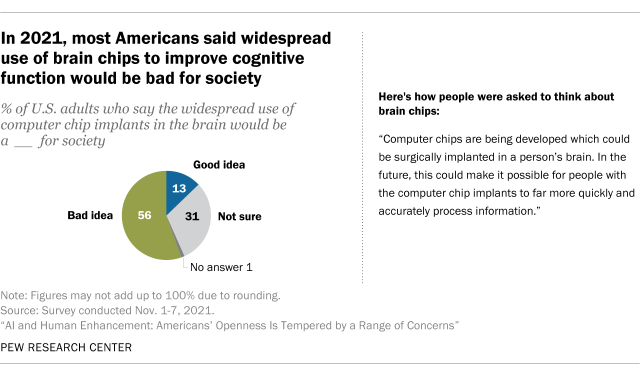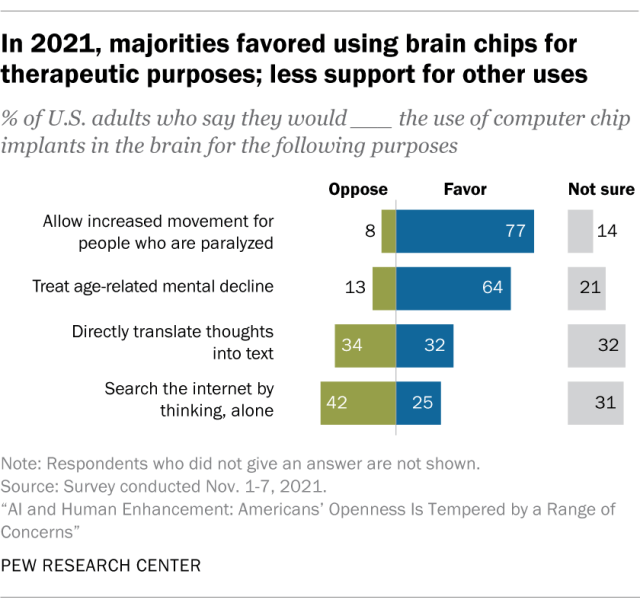Elon Musk announced on Jan. 29 that his company Neuralink had surgically implanted its first computer chip in a living person’s brain. The chip is intended to allow people to use phones or computers simply by thinking about what they want to do on the devices.
In a fall 2021 Pew Research Center survey, we asked Americans about the prospect of computer chip brain implants that might one day allow people “to far more quickly and accurately process information.” Americans generally expressed cautious and negative views about the idea, but their opinions varied depending on how such chips might be used.
In response to the news that Neuralink had implanted its first computer chip in a live person’s brain, Pew Research Center looked back at several questions we asked about this technology in 2021. We surveyed 10,260 adults from Nov. 1 to Nov. 7, 2021, as part of a broader survey about artificial intelligence and human enhancement.
Everyone who took part in the survey is a member of the Center’s American Trends Panel (ATP), an online survey panel that is recruited through national, random sampling of residential addresses. This way, nearly all U.S. adults have a chance of selection. The survey is weighted to be representative of the U.S. adult population by gender, race, ethnicity, partisan affiliation, education and other categories. Read more about the ATP’s methodology.
Here are the questions used for the analysis and its methodology.
More than half of U.S. adults (56%) said that widespread use of brain chips to enhance cognitive function would be a bad idea for society. Only 13% said it would be a good idea, and 31% weren’t sure. A large majority (78%) said they would not want a chip implant for themselves, while 20% said they would want one.

Consistent with these views, 63% of Americans said in the 2021 survey that the widespread use of brain chips would be “meddling with nature and crosses a line we should not cross.” A much smaller share (35%) said their views were better described by the statement “as humans, we are always trying to better ourselves and this is no different.”
Highly religious Americans were particularly likely to see brain chips as crossing a line: Among those with high levels of religious commitment, 81% said this, compared with half of those with low levels of religious commitment. (Religious commitment is measured by three self-reported items: the importance of religion in Americans’ lives, their frequency of attending religious services and their frequency of prayer.)
How support for brain chips varies by their intended use

Despite the widespread caution about computer chip brain implants in the 2021 survey, Americans were largely open to using such chips for therapeutic purposes. For instance:
- 77% favored using computer chip brain implants to allow increased movement for people who are paralyzed.
- 64% favored using them to treat age-related mental decline.
By contrast, far smaller shares supported using brain chips for some other purposes, where no therapeutic benefit was clearly stated:
- 32% favored using them to directly translate thoughts into text.
- 25% favored using them to search the internet by thinking alone.
Sizable shares of adults weren’t sure how they felt about these potential uses.
Neuralink’s initial recruitment efforts for a brain chip implant focused on people with quadriplegia, but Musk has also talked about using the chips for broader purposes. Neuralink’s mission statement alludes to both, saying the company aims to “restore autonomy to those with unmet medical needs today and unlock human potential tomorrow.”
Views on standards for testing, review of brain chips
Brain chip implants are currently in testing and development. Our 2021 survey found deep public concern about how they would be reviewed and vetted. For example, most Americans (83%) said they wanted brain chips to be tested for safety and effectiveness using a higher standard than exists for medical devices. And 78% said that brain chips would probably or definitely be used before we fully understand how they affect people’s health.
Note: Here are the questions used for the analysis and its methodology.
